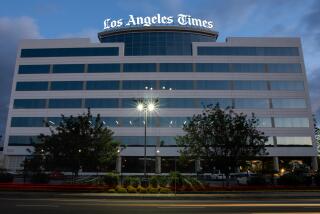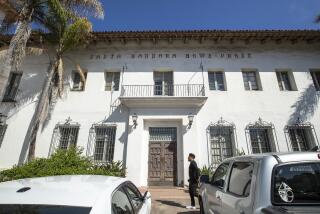News-Press owner denies firing 8 workers
- Share via
Santa Barbara News-Press Publisher Wendy McCaw testified Tuesday that she didn’t demand multiple firings in her newsroom but was troubled by what she viewed as biased reporting in several stories that appeared in her newspaper.
She said it was those concerns -- and not union activity in the newsroom -- that led to the firing of eight reporters this year.
During questioning, attorney Barry Cappello, who is representing the newspaper, asked McCaw if two reporters were fired in January because of union activity.
No, McCaw answered without elaborating.
She later testified that an additional six employees had been fired for disloyalty after they held signs over a freeway overpass urging people to cancel subscriptions.
McCaw’s three hours on the stand were the highlight of 16 days of testimony before Judge William G. Kocol, who is hearing the case brought by the National Labor Relations Board. The trial is expected to conclude this week.
Attorneys for the federal labor board are prosecuting McCaw’s company, Ampersand Publishing, on charges that it illegally fired six reporters in February in retaliation for union activity.
McCaw’s attorneys have argued that City Editor Scott Steepleton, and not McCaw, fired the employees for allegedly writing biased articles or making errors. Cappello, Ampersand’s lead attorney, said McCaw set policy but that Steepleton made the decisions on whom to fire.
As for killing stories, McCaw as publisher had a legal right to decide what appeared in her paper, Cappello said.
A publisher can tell a reporter “what news to cover and what news not to cover,” he told reporters outside a federal courthouse in Santa Barbara, where the hearing is being held.
McCaw, 56, bought the paper in 2000 from New York Times Co. She has been at war with her employees since July 2006, when five top editors resigned to protest what they said was McCaw’s censorship of local news. Since then, union activists have said, the exodus has totaled about 50.
On Tuesday, McCaw testified that she considered it disloyal when the six newsroom employees displayed the signs above the freeway.
“It was disparaging our product and it was also trying to create financial harm,” she said.
The government said the demonstration was a protected union activity.
Cappello produced several e-mails and handwritten notes sent by McCaw beginning in 2003 complaining about bias in stories, including an item about a plan by the Hope Ranch Assn. to kill coyotes on the property.
“It was anti-coyote,” McCaw said in explaining why she thought the story was biased. “It was very negative toward those poor animals who are on the verge of being annihilated.”
In other memos, McCaw said she was “sick” of the bias and called it “disgusting.”
When cross-examined by National Labor Relations Board attorney Brian Gee, McCaw said she believed Steepleton had helped eliminate bias from the paper, although she said she did not know whether he had conducted any training for employees or produced any guidelines for unbiased reporting.
When the day’s testimony ended, McCaw quickly exited the courtroom through a side door accompanied by attorneys. Twenty minutes later, she emerged from the courthouse with her entourage and ignored questions shouted by reporters.
--
catherine.saillant@latimes.com
The Associated Press contributed to this report.
More to Read
Sign up for Essential California
The most important California stories and recommendations in your inbox every morning.
You may occasionally receive promotional content from the Los Angeles Times.














